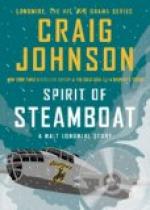[Footnote 7: Broken ice, between large cakes, or against the shore.]
The planter stopped speaking. We had all gone along so with the story, that the stout seafarer, as he wrought the whole scene up about us, seemed instinctively to lean back and brace his feet against the ground, and clutch his net. The young woman looked up, this time; and the cold snow-blast seemed to howl through that still summer’s noon, and the terrific ice-fields and hills to be crashing against the solid earth that we sat upon, and all things round changed to the far-off stormy ocean and boundless frozen wastes.
The planter began to speak again:—
“So I falled right down upon th’ ice, sayun, ’Lard, help me! Lard, help me!’ an’ crawlun away, wi’ the snow in my face (I was afeard, a’most, to stand), ‘Lard, help me! Lard, help me!’
“‘T was n’ all hard ice, but many places lolly;[8] an’ once I goed right down wi’ my hand-wristes an’ my armes in cold water, part-ways to the bottom o’ th’ ocean; and a’most head-first into un, as I’d a-been, in wi’ my legs afore: but, thanks be to God! ’E helped me out of un, but colder an’ wetter agen.
[Footnote 8: Snow in water, not yet frozen, but looking like the white ice.]
“In course I wanted to folly the schooner; so I runned up along, a little ways from the edge, an’ then I runned down along: but ’t was all great black ocean outside, an’ she gone miles an’ miles away; an’ by two hours’ time, even ef she’d come to, itself, an’ all clear weather, I could n’ never see her; an’ ef she could come back, she could n’ never find me, more ‘n I could find any one o’ they flakes o’ snow. The schooner was gone, an’ I was laved out o’ the world!




